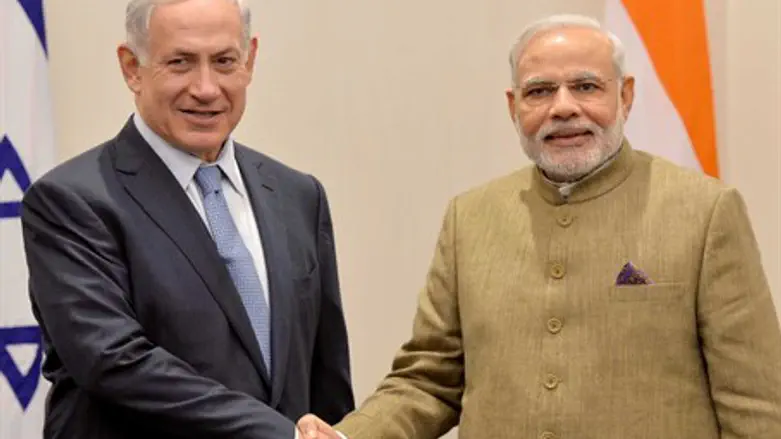
India's Union Home Minister Rajnath Singh is set to make a high-level visit to Israel next month, in the first Home Minister visit since a 2000 trip that began resurgent bilateral ties - the visit comes after India last month approved a $144 million missile purchase from Israel.
Singh, whose position is roughly parallel to Internal Security Minister, is to meet Prime Minister Binyamin Netanyahu on November 6 as part of a four-day trip with senior officials, Indian diplomatic sources told the Times of India on Thursday.
India is currently the largest buyer of Israeli defense hardware, and Israel's military delegation to India is second only in size to its delegation to America. The two countries also have a Joint Working group on counter-terrorism, with bilateral ties flourishing under India's new Prime Minister Narendra Modi.
Netanyahu and Modi met in New York last month, where he told him "we are excited about the possibilities of stronger ties with India, and the sky is the limit."
The statement came the same month that Modi approved the purchase of 262 Israeli-made Barak 1 surface-to-air missiles, in a $144 million deal that will arm India's 14 battleships over the course of five years.
The deal had been frozen since a scandal in 2006, when suspicions of corruption by Indian politicians surfaced claiming that they had taken bribes in return for advancing weapons deals. Those suspicions were never proven, and with Israeli-Indian ties flourishing the deal has come back into play.
India has been actively buying Israeli weapons; last year it approved the purchase of 15 Heron drones.
The two countries are also involved in joint military projects, with Israel developing the Barak 8 advanced missile in cooperation with India, further pointing to the strong military ties.
Reportedly Israel is also looking to sell its Iron Dome anti-missile defense system to India as well, as India is interested in using the system to defend its key assets.
As defense ties with America continue to grow tense, as highlighted in Operation Protective Edge when US President Barack Obama froze the routine transfer of Hellfire missiles to Israel and ordered scrutiny on future shipments, Israel continues to show signs of developing Asian allies such as India, China and Japan.